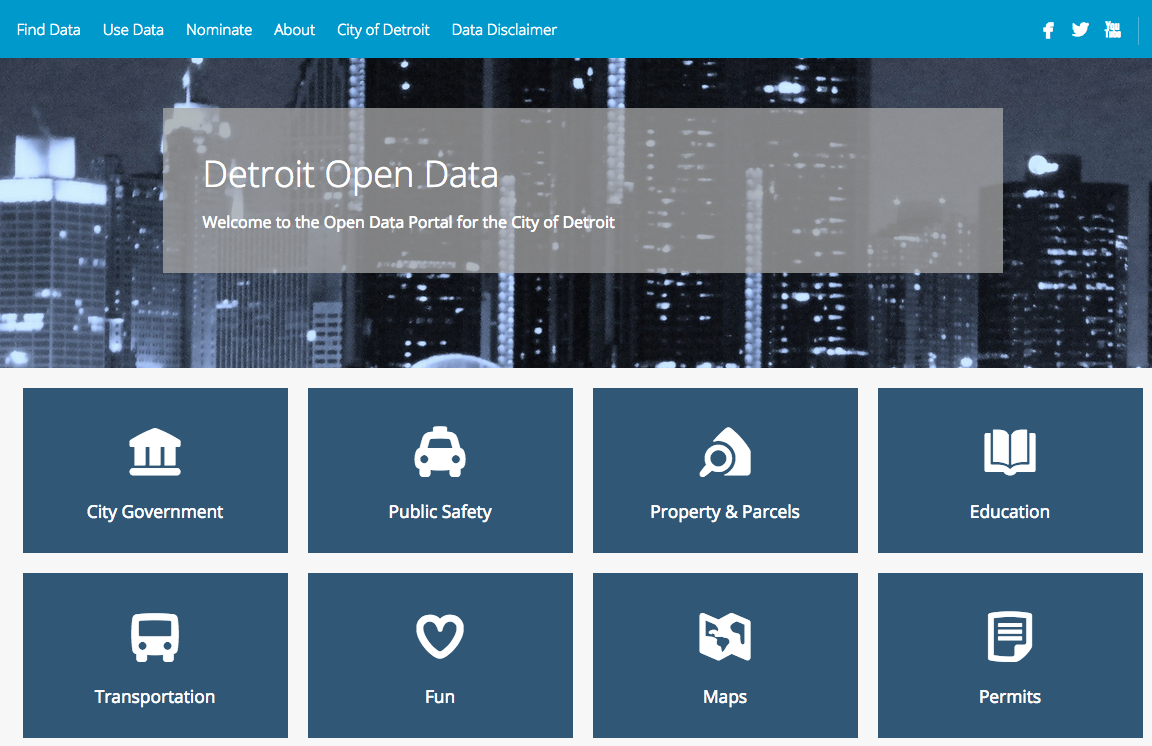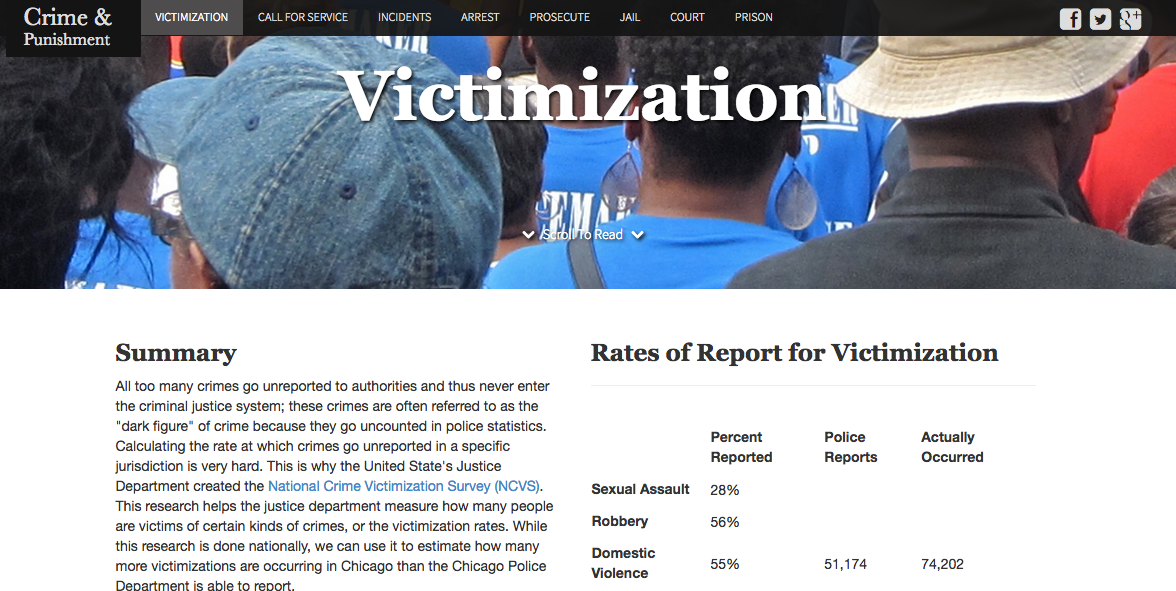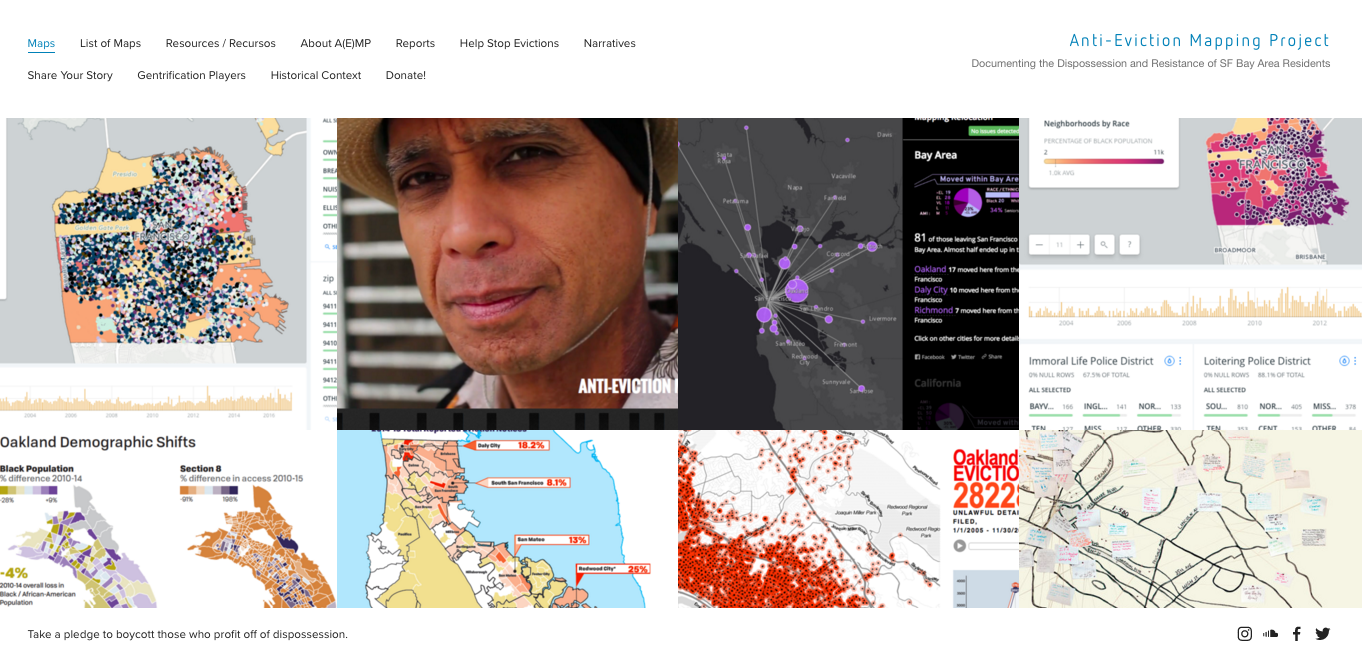Research Method: Data Policies
Open data – a process of making non-personal, public information broadly accessible and usable by people and computers, free of any constraints - is a fast-growing movement within government. Detroit’s new data portal, generously donated by the Socrata Foundation, is accessible at data.detroitmi.gov.
Background on Open Data in Detroit
Initiation
- The GO DATA (Government Open Data Access To All) initiative was established in February 2015 by Executive Order 2015-02
- The city’s official press release stated that the City of Detroit “took a major step toward becoming a more transparent government by launching the first phase of its new Initiative, which will make volumes of information more easily accessible to the public at no cost.”
- The purpose is to increase the accessibility and the availability of certain data collected or maintained by the City.
- The goal, according to Mayor Mike Duggan, is to create a more open, collaborative and accountable relationship between the City government and the people it serves.
- The cornerstone of this major shift in City policy will be that data and information, unless exempt from disclosure under State or federal law, will be available to the public.

Growth
- Portal started with 75 individual datasets, now holds about 140
- Started with 9 participating departments and agencies, now at least 15:
- Detroit Police, Buildings, Safety, Engineering and Environmental Department, Detroit Land Bank Authority, Planning and Development, Recreation, Public Works, Assessor, DDOT, City Clerk/Elections, Detroit Building Authority, Department of Neighborhoods, Detroit Fire Department, Detroit Public Schools, SMART transit, SeeClickFix/Improve Detroit App
These gains can be referenced in detail through the Public Dataset Inventory, which describes all datasets included in the portal to date.
Gaps, issues, and questions to inform future data releases and initiatives
- Financial datasets about City contracts and grants have yet to be released, despite initial announcements for its forthcoming release in summer 2015, and an updated publishing timeline remains unknown.
- The first open data Advisory Committee has only been recently convened, even though the nomination process began at the portal’s launch. Will objectives and notes from this working group of residents be shared through the portal or elsewhere?
- Many datasets on the portal still lack well-documented metadata, like field definitions or a data dictionary that describes that dataset. We think that DPD’s Citizen Complaints dataset is an effective example of useful documentation as it includes a description, field definitions and contact information for learning more about the data, but unfortunately datasets documented as thoroughly as that one seem to be the minority of those available through the portal.
Open Data in Other Cities
Releasing data through the City’s data portal is a first step of the GO DATA Initiative. We see our data justice recommendations as meaningful strategies for continuing to implement open data in Detroit in ways that focus on greater access and accountability, and engage a more diverse community of users to generate policy provisions for greater government transparency.
To vision our dream open data ecosystem in Detroit, we’ve looked to the transparency policies, data portals and open data practices and tools in place in other cities around the U.S. for inspiration. Members of the DDJC and DCTP have also investigated other cities data portals and civic data-driven applications to find inspiration. Our favorite discoveries that could be meaningfully adapted to Detroit data are described below.
Data Policy
The Sunlight Foundation’s Open Data Policy Map has been a key resource for comparing and contrasting policy language and initiatives across cities. We learned that many cities first launch their open data portals through Executive Orders, City Council Resolutions or Mayoral Directives like Detroit, but that cities who have adopted full open data legislation often adhere better to Sunlight’s Best Practices for policy.
Legislation often allows for more thoroughness than the simpler legalese of an Executive Order, which supports the case for much needed policy provisions to ensure the most just implementation of open data. Seattle, San Jose CA, Waco TX, Las Vegas,Cambridge MA and Chicago are some notable municipalities that are successfully putting Sunlight’s guidelines for open data stewardship into practice.
Sharing Freedom of Information Act (FoIA) Requests
- In Chicago, users can search FoIA Request Logs by City department.
- Washington DC hosts a website where users can digitally submit a FoIA request or appeal, track its status and search past responses and associated public records.
Comprehensively defining “Public Safety” and looking beyond crime incidents
- New York uses a broad, less crime-focused definition of “Public Safety”, including datasets about evacuation zones, lead-based paint dwellings, fire codes, citizen emergency response teams and warming centers.
- SmartChicago’s Crime and Punishment app looks beyond the point of crime to trace data sources from commission all the way to prisons, and provides valuable documentation about criminal justice data accessibility throughout.
Using open data to better communicate with our government
- Councilmatic is at work in Philadelphia, New York, Chicago and more and lets users track the status of bills in City Council, contact their council representatives sponsoring the legislation and share their opinions through comments.
- SimpliCity, developed by the City of Ashville, NC, prompts users to ask civic questions related to an address or property location, like “when is my recycling pick-up day”? This tool parses many types of City data into digestible, relevant answers to everyday questions.
Open data for storytelling and investigative reporting
- The Anti-Eviction Mapping project out of California’s Bay Area is an inspiring example of how to use housing and property data in combination with interviews and oral histories to preserve a sense of place.
- An analysis of traffic tickets, specifically for bicyclists, in Tampa Bay exposed a data-driven case of racial biases and inequality in policing.
Increasing transparency around methods for analysis
- The Media Mobilizing Project in Philly drew our attention to new methods of using crime statistics and other City-generated open data to do predictive sentencing" analysis. While this type of analysis has opportunity to inform criminal justice reform, we notice a lack of community oversight and input into the methods of analysis and algorithms developed - and as FiveThirtyEight explains, these algorithms can encode and reinforce racial biases.

